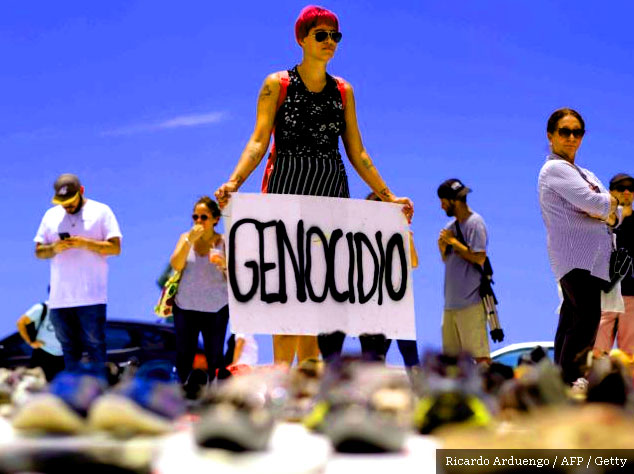Trump Was Right About Puerto Rico, Critics Manipulating Hurricane Maria Death ‘Estimates.’
Article by Joel B. Pollack, September 13, 2018, Breitbart
Democrats and the media have been pounding President Donald Trump over the past few days, as Hurricane Florence nears the Carolinas, over his alleged insensitivity to deaths in Puerto Rico last year from Hurricane Maria.
On Thursday morning, President Trump pushed back on Twitter, alleging that Democrats had inflated the death toll “in order to make me look as bad as possible.”
That led to more criticism, with the Associated Press accusing Trump of making claims “without evidence.”
But Trump is correct.
His opponents — including the media — have strained for more than a year to turn Hurricane Maria into his version of Hurricane Katrina, the devastating 2005 storm that prompted criticism of President George W. Bush’s response — even though state and local authorities had been far worse — and foreshadowed a Democratic takeover of Congress in 2006.
Leading the charge was CNN, which made a special effort to link Hurricane Maria in 2017 to Hurricane Katrina in 2005, and made a temporary media sensation of San Juan Mayor Carmen Yulín Cruz, who accused the Trump administration of neglect.
However, the media’s effort at the time was frustrated by several factors. First, experts praised the federal government’s response to Hurricane Maria, which posed special challenges because Puerto Rico is so far from the mainland U.S.
Second, Puerto Rico Governor Ricardo Rosselló himself praised the federal government’s response: “The president and the administration, every time we’ve asked them to execute, they’ve executed quickly,” he told Fox News in September 2017.
Third, Puerto Rico was already something of a disaster before the hurricane hit, thanks to mismanagement by the territory’s government that led to a debt crisis in recent years. (Mayor Cruz herself is reportedly under FBI investigation for corruption.)
However, Trump’s critics did not give up. Over the past several months, they have attempted to cite several new studies that created new estimates of the “real” death toll of Hurricane Maria — based on statistical models, not on actual death counts.
Many studies addressed a real concern that the Puerto Rican government lacked the competence to do an accurate death count, but much of the media hype around the results was clearly motivated by the attempt to damage the Trump administration.
The Washington Post noted just some of the studies as of June 2018 (original links):
- The New York Times calculated 1,052 deaths through October.
- The Center for Investigative Reporting calculated 985 through October.
- University of Puerto Rico-Mayagüez professors calculated 822, with a 95 percent confidence range that the total was somewhere between 605 and 1,039.
- Pennsylvania State University professors calculated excess deaths of about 500 in September, or a total of 1,085 if the same pattern held in October. That estimate was based on six weeks of mortality records.
- A Latino USA analysis, using updated data from Puerto Rico’s Department of Health, calculated 1,194 excess deaths in September and October.
The Post noted that the new estimates hovered around the 1,000 mark.
Then, in June, a Harvard study published in the New England Journal of Medicine estimated the number of deaths from Hurricane Maria at 4,645 instead of the official figure of 64. The researchers had conducted a survey and extrapolated the results — an extremely sloppy methodology.
The number was highly inflammatory. Puerto Rican opponents of the president cited it to accuse him of “genocide.” Much of the media hyped those claims: the caption that accompanies the Getty/AFP photograph above reads: “Hurricane Maria, which pummeled Puerto Rico in September 2017, is likely responsible for the deaths of more than 4,600 people, some 70 times more than official estimates, US researchers said Tuesday.”
Even the Post was skeptical of the absurdly high estimate: “This is not a verified number, unlike body counts in wars. The Harvard study offers only an estimate – a midpoint along a broad range of possibilities. It is not based on death records, only estimates of deaths from people who were interviewed in a survey.”
Last month, a new study was produced by George Washington University that estimated the “excess mortality” from Hurricane Maria over a six-month period at 2,975 within a 95% confidence interval of 2,658-3,290 “excess” deaths.
This was the second-highest estimate after the faulty Harvard study, and was based on a statistical model that subtracted the number of people who theoretically should have died over the same period from the number of people who actually died during that time.
It is also a rather useless way of comparing death tolls, because in order to evaluate the relative scale of Hurricane Maria, the same method would have to be used to measure other natural disasters, likely increasing their estimated death tolls as well.
The media reported the new estimate as if it were an actual confirmed death toll — with CNN taking care to note that the new number was released near the anniversary of Katrina. The Puerto Rican governor, under heavy political pressure due to the slow pace of the island’s recovery, officially revised the death toll to match the estimate.
That gave the media an excuse to throw out science and statistics, and to report the 2.975 number as an established fact — even though it was just an estimate based on a statistical model, and three times higher than all but one of the previous estimates.
The AP reported earlier this week that “3,000 people died in Puerto Rico” in Hurricane Maria — as if it were a proven fact. It did not indicate that the number was simply one estimate among many, and that its evidence was a controversial statistical model.
On Thursday, the AP — with a touch of chutzpah — accused the president of stating “without evidence” that the “Puerto Rico hurricane death count is [a] plot by Democrats to make him look bad.”
(Update: National Public Radio weighed in to accuse Trump of “falsely” claiming Democrats had inflated the numbers.)
Setting aside the AP’s odd effort to “fact-check” an opinion, the evidence is ample that the Democrats — and much of the media — did exactly what Trump accused them of doing.
Their goal, and the goal of Democrats who are hyping probable outliers as established facts, is to take down the Republican Party in the 2018 midterm elections by linking Trump with Bush’s alleged failures in Hurricane Katrina.
Joel B. Pollak is Senior Editor-at-Large at Breitbart News. He is a winner of the 2018 Robert Novak Journalism Alumni Fellowship. He is also the co-author of How Trump Won: The Inside Story of a Revolution, which is available from Regnery. Follow him on Twitter at @joelpollak.
Article by Joel B. Pollack, September 13, 2018, Breitbart
_______________________________
Wow! Even Resistance Hero Ruth Bader Ginsburg Slams ‘Highly Partisan’ Kavanaugh Hearings! - Breitbart


